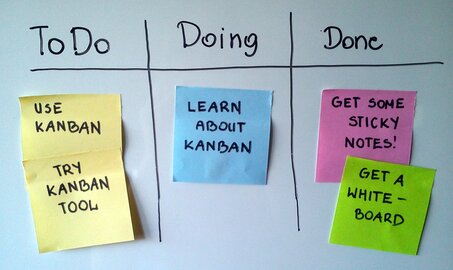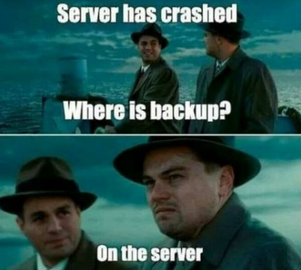While Loops and Life Hacks
Posted on Sat 06 January 2024 in Python

Applying Software Engineering Principles to Everyday Challenges
It's that time of year and again I've made a resolution to post once a month (same as the past 3 years).
I was looking around for posts and came across the old trello board we used when buying a house. How it made the whole process less daunting. Using an agile board to manage projects is something I use every day as a developer. I'm sure there's other ideas I use as a developer that I use in my normal life to make it easier. I'll make a list and share it with the world.
Here are some development principles that should be most applicable to real life.
Modularisation

(Or modularization for my US friends.)
I was taught this in my very first A-Level computing lesson (in the old days). You have a huge task, you don't know where to start or how it will get done.
We'll use the example of booking a holiday.
You first break the task down into its major components. Flights, accommodation and activities. Take each of these tasks and break them down, say flights -> get a passport, find flights, book flights. Find flights can be further split down into find availability, find cheapest. Iteratively breaking down big tasks into smaller tasks.
By the end of the process you should have a load of easily achievable tasks.
You also need to consider the dependencies amongst the tasks. For example the location of the activities you plan will be dependent on the location of the accommodation.
Kanban Boards

This is what gave me the idea for the article. Something most companies use to manage development work. Each piece of (freshly modularised) work has a ticket. In the most basic example there are 3 columns, ToDo, Doing and Done. Tickets start in the todo column.
You pick up a todo ticket, and put it in the doing column and add your name to it. Do the work and once the work is done it's put in the done column. If work is blocked for whatever reason, you pick up another todo ticket while it waits to get unblocked (sometimes a manager or scrum master will help clear the blockages).
You don't want to put all of your work into the todo column because it will become really unwieldy. You have another column called backlog. Put all of the work in there. I work on 2 week 'sprints'. This means taking, from the backlog, what we think can be achieved in 2 weeks and putting them in todo. Then you have 2 weeks to move those tickets across to done. At the end of the sprint, in an ideal world, you clear down the done column and start a new sprint. Tickets in doing are rolled over to the next sprint.
When moving house we used kanban to manage the project and it took a huge amount of stress out of it. We used Trello, the free online board.
Below is a demo of the board. Some tickets were delayed out of our control so we added a delayed column. Notes about status and phone numbers can be added to the tickets and you can see a small image of who is working on it. In theory anybody could see where a ticket is up to and progress it further.

The goal is to get tickets across the board. If you have too many tickets in doing, you need to stop picking up more tickets and focus on existing work. If a ticket is too much work or going to take too long, it should be split up into smaller tickets.
DRY/YAGNI

- DRY - Don't Repeat Yourself
- YAGNI - You Ain't Gonna Need It
I've put these two together as they are vaguely related.
DRY is removing duplication. For example each function in a program doesn't really need to contain the same code to talk to a database. They all talk to the same database driver. To fix this you only have one set of code to handle the database interactions, that does one thing and does it well.
In real life this could be something like having two hedge trimmers. Nobody needs two, put one on ebay and buy something useful!
YAGNI for developers means removing code that is no longer needed and also not adding code 'just in case' it's needed in the future. Some developers can get sentimental but having old code hanging about means that code still needs to be maintained and can cause bugs.
In real life this can be something like still having a DVD player plugged into your TV. If you haven't watched a DVD in 12 months, unplug it and put it into the loft at least.
Yagni is also something the Money Saving Expert guy preaches. Even if something is super cheap, if you buy it and don't use it, then it is expensive.
Backups

Data storage is cheap and being able to get an application backup and running after a failure is hugely important. Having a backup and recovery strategy should be part of every application.
Too many times I've seen how a person's phone has broken and they have now lost all of the pictures of their grandkids. You can protect yourself against this. It could be taking regular backups of your phone, or backing up files to a separate usb drive. My favourite is google photos. Put it on your phone and it backs up all of your photos to the cloud with no technical know how.
It's hard or futile to back up certain physical things. My wife and I have a shared calendar online. If we receive a doctor's appointment in the post, it takes a couple of minutes to create a calendar event, take a picture of the letter and add it to the event. Searching through drawers for an old letter is a thing of the past.
Pair programming - Bus factor

A good way to get new developers up to speed is pair programming. This is where two programmers sit at one computer and build a task. Having two people working together should provide a cross pollination of ideas and upskilling.
Bus factor is an odd one. How many devs could get hit by a bus before there isn't enough knowledge to keep an application running. You could have 20 developers but if only 1 developer knows how part of the app works then you have a bus factor of 1 and are at risk.
My wife and I sort out a lot of the important things together. Things that affect the household are organised through the joint bank account, things like house insurance and the tesco clubcard. I'm hoping that for keeping our house running we have a bus factor of 2.
KISS

Keep It Simple Stupid
Don't over engineer things. Don't make it too complicated. Build it as obvious and simple as possible. This makes code easier to maintain and understand.
In real life you can benefit from streamlining things. Having bank accounts across multiple banks, cooking meals with tons of ingredients when a few core ingrediants will do.
Technical debt

Tech debt is where you intend to change some code to work better but due to time constraints you can't. You intend to fix it in the future but it sits in the code for months. Over time if you don't put in the effort to fix this debt you can end up with a bad codebase. It takes longer and longer to add new features and your code becomes more unstable. The longer you ignore the debt the longer it will take to fix.
If something needs fixing in your life it is often quicker to fix it now than later on. Wobbly door handle? fix it now before it falls off or one of the kids gets stuck in the bathroom. Batteries in the remote need changing? Nobody likes having to stand up and press buttons on a tv like some kind of caveman!
A constant stream of small fixes and maintenance can pay huge benefits over a lifetime.
Others
There are some other dev principles that can apply to real life but I'm ill and ending the post here.
- Debugging
- Root cause analysis
- Continuous deployment